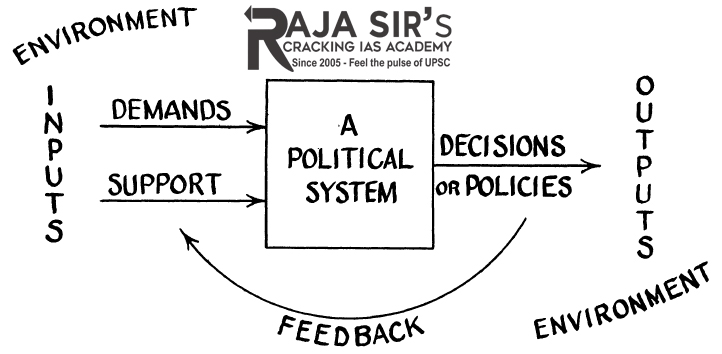- Home
- Prelims
- Mains
- Current Affairs
- Study Materials
- Test Series
What is meant by systems approach to comparative politics and governments.?. Critically evaluate its utility. - 15 Marks (Political Science and International Relations - Daily Answer Writing Practice)
Comparison is one of the oldest form of study of politics. Broadly the goal of comparative politics is to encompass the major political similarities and differences between countries. The task is to develop some perspective on the mixture of constants and variability which characterizes the world’s government and the context in which they operate.
- The notion of Systems Theory was emerged from ancient time, dates back to 1920s. Ludwig Von Bertallanfy is considered as the earliest advocate of the general systems theory. He utilized this theory for the study of Biology.
- The political system operates within an environment. The environment produces demands from different parts of the society such as demand for reservation in the matter of employment for certain groups, demand for soothing working conditions or minimum wages, demand for better transportation facilities, demand for better health facilities. Different demands have different levels of support. Easton said that both ''demands'' and ''supports'' establish ''inputs.'' The political system receives theses inputs from the environment. After considering various factors, the government decides to take action on some of these demands while others are not acted upon. Through, the conversion process, the inputs are converted into ''outputs'' by the decision makers in the form of policies, decisions, rules, regulations and laws. The ''outputs'' flow back into the environment through a ''feedback'' mechanism, giving rise to fresh ''demands.'' Accordingly, it is a recurring process.
- A political system has three important characteristics, specifically, comprehensiveness, interdependence and existence of boundaries. However, the features of a political system are openness, adaptiveness, comprehensiveness, self-regulating, ongoing. It is composed of a number of structures which have specific functions. These functions are pigeonholed as input and output functions. A political system performs these in order to maintain itself.

Strengths
- System’s approach gave several applications found in works of Herbert Spino, Karl Deutsch and Morton Kaplan. They either follow Easton’s conceptual framework or a parallel framework.
- System’s approach is problem solving rather than merely descriptive. System approach is essentially comparative in nature and follows inter-disciplinary approach.
- It studies processes, context, environment, etc unlike traditional approach.
- Other strengths include having elements like caste, religion, ethnicity, etc as parameters. Interaction in system is patterned, and not haphazard.
Limitations
- However, the System Approach has certain weaknesses as it doesn’t take micro perspective. It takes macro perspective only explain institutions, and functions within political system. Example: Judiciary.
- Thorson argued that persistence of the system is central not only to Easton’s theory but to his exposition as well. He further argues that Easton’s framework is both mechanistic and artistic at the same time-like a machine which is also alive but lacks operational possibilities. William Mitchell criticized Easton’s concept of politics as the allocation of values, as leading to misleading assumptions in theorizing politics.
- Traditionalist says that system’s approach is nothing but conceptual framework. It brings complications, lacks analytical depth, and is too general in nature.
- Marxist call it status quoist, Eugene Miller presented a status-quo oriented general theory of political system. Political system approach of Easton lost its importance as he opted for the dogma of empiricism. Other Marxist scholars claim it ‘status quoist’ as it is modelled on functioning of western liberal democracies, thus trying to depict it as "ideal type". It will lead to other comparing themselves & trying to be near liberal way. Also, it has no scope for explaining "civil unrest", revolutions, crisis, and other Constitutional changes which are regular in 3rd world countries. Hence it is called ‘status quoist’ as it takes order & stability in Western countries also for granted.
- Paul Kress called System''s approach empty vision of politics which lacks substance & projects very artificial nature of working of political system.
The merits of the input-output or political system approach cannot be ignored. The approach has provided an excellent technique for comparative analysis. It has also provided a set of concepts and categories which have made comparative analysis ignore interesting and instructive. According to Eugene Meehan, "Easton has produced one of the few comprehensive attempts to lay the foundation for systems analysis in political science and to provide a general functional theory of politics."









 Latest News
Latest News
 General Studies
General Studies